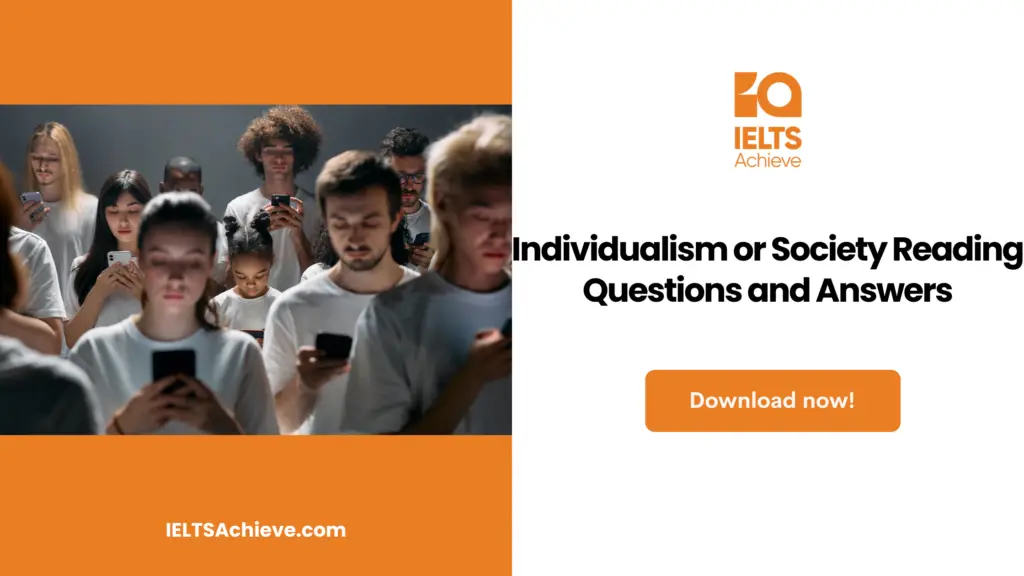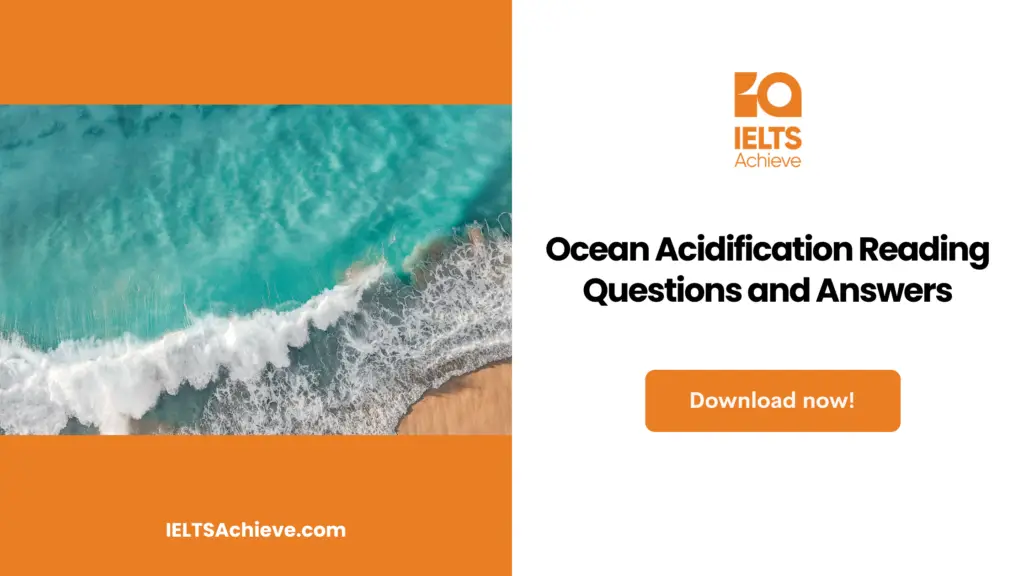The Blog post contains the following IELTS Reading Questions:
- IELTS Reading Short Answer Questions
- IELTS Reading Yes/No/Not Given
- IELTS Reading Multiple Choice Questions
Stay informed and prepared for success – Explore our comprehensive Reading Test Info page to get valuable insights, exam format details, and expert tips for mastering the IELTS Reading section.
IELTS Reading Passage – Individualism or Society

Individualism or Society
The human trait known as individualism can be understood in two distinct ways. The first implies an individual’s aspiration to self-reliance or independence, and the need to exist as individual human beings. The second, by contrast, is understood as a social theory which prioritises freedom of action by individuals over the authority of an all-powerful state. As far as the second conception is concerned, individualism as a discrete construct of Western thought really came to the fore with the onset of capitalism in the late seventeenth century. The two most influential English political philosophers of that period —and since —Hobbes and Locke, outlined ideal models of government of a distinctly individualist hue. In their view, the state’s function was to protect a citizen’s individual liberties and interfere with any citizen’s actions only when those actions violated another individual’s right to act freely. For both, society is nothing more than an agglomeration of individuals; it has no reality independent of the individuals that make it up.
In practice, in the context of late twentieth and early twenty-first century developed societies, the term ‘individualism’ is generally congruent with a world view whose adherents wage a metaphorical low-level war against what they perceive to be the incessant and incremental growth in the power of the state. True individualists would undoubtedly argue that society’s attempts to regulate the individualist’s two most closely guarded spheres of personal liberty — economic and civil — will always represent individualism that is most keenly fought over battlegrounds. This strongly individualistic view of the role of society is often referred to as ‘libertarianism’.
An intriguing characteristic of those professing to be libertarians is that they can happily disagree, equally vehemently, with a government policy on, say, education, from either a distinctly ‘left’ or a distinctly ‘right’ libertarian perspective. Indeed, commentators and opinion formers in the mass media readily admit that one of the most fascinating aspects of these manifestations of modern individualism of either kind is just how frequently both claim 30 to be the authentic standard bearers of libertarianism. Thus anarchists arguing for their particular vision of libertarianism would never be seen dead breaking bread with right wing neo-liberal libertarians – or vice versa.
In the 1980s, champions of ‘deregulation’ announced their mission to ‘set the people free’ from the suffocating yoke of ‘big government’ or the ‘stranglehold of regulation’. So it was that in Britain enterprises once state-owned were privatized and public utilities such as telecoms, gas, electricity, and water were rapidly sold off. Moreover, unified transport systems took on multiple identities when the networks of trains and buses, most of which had previously been owned by the state, were put up for sale and then snapped up by a host of individual private companies.
It is fair to say that notwithstanding the social and political manifestations of individualism, which are still pillars of orthodoxy in many developed western countries – such as the USA and Britain – probably the most striking evidence of the enduring strength of individualism, and just how deeply this view of society has permeated all fields and forms of the contemporary arts, is the celebrity culture that surrounds us nowadays. Being famous, or better, being famous for just being famous has become almost an article of faith for wannabes everywhere. The seemingly insatiable public appetite for reality TV and tabloid newspapers, in addition to the all-pervasive celebrity photo journalism that fills a plethora of ubiquitous glossy magazines, are living testimony to Andy Warhol’s dictum that anyone ‘can be famous for fifteen minutes’ these days.
But the cult of celebrity alone does not convey the enduring power of individualism. Pause to reflect for a moment, and try to think of one truly great film, play, or popular song that could ever have achieved such universal acclaim without an individual voice at its narrative core. Surely, this is why Frank Sinatra timelessly strikes a chord with the individualist in all of us when he sings ‘I did it my way’.
Unlock your full potential in the IELTS Reading section – Visit our IELTS Reading Practice Question Answer page now!
Recommended Questions:
Renewable Energy IELTS Reading Question with Answer
Questions 1-6
Do the following statements agree with the views of the writer in the Reading Passage? Write
YES if the statement agrees with the views of the writer.
NO if the statement contradicts the views of the writer.
NOT GIVEN if it is impossible to say what the writer thinks about this.
1There are two discrete interpretations of the term individualism.
2The rise of individualism caused disquiet among governments in Europe.
3The prominence of individualism as a concept coincided with the rise of capitalism.
4Hobbes and Locke had little impact in the late 1700s.
5Hobbes and Locke’s ideas about the state were not pro-individualist.
6Individual liberties must be preserved because they guarantee protection against the state.
Want to excel in identifying the writer’s views and claims? Click here to explore our in-depth guide on how to accurately determine Yes, No, or Not Given in the IELTS Reading section.
Questions 7-11
Answer the questions below using NO MORE THAN THREE WORDS from the passage for each answer.
7According to individualists, which two areas of personal freedom must be protected from state regulation?…..
8What name is given to the view that society should not limit individuals’ rights to do as they wish?……………
9Before the 1980s, who owned most of the transport networks in Britain?
10According to the writer, what is the clearest evidence of the continuing importance of individualism in society?…
11According to the writer, what feature must a film or song have to make it popular?……..
Questions 12 and 13
12What strange trait does the writer mention about individualists?
AThey can hold completely opposite political positions.
BThey do not often disagree with government policy.
CTheir opinions are shaped by the mass media.
DThey have different views on the role of the government in education.
13Which of the following statements best summarizes the writer’s view of individualism?
AIndividualism has become less important since its conception in the late seventeenth century.
BThe adherents of individualism disagree over how much the government should regulate personal liberty.
CThe strength of individualism is reflected in many aspects of contemporary politics and culture.
DIndividualism is the cause of most conflicts in society today.
Ready to improve your performance in Multiple Choice Questions (MCQs)? Click here to access our comprehensive guide on how to tackle MCQs effectively in the IELTS Reading section.
Unlock your full potential in the IELTS Reading section – Visit our IELTS Reading Practice Question Answer page now!
Recommended Questions:
Renewable Energy IELTS Reading Question with Answer
Answers
1Answer: Yes
2Answer: Not Given
3Answer: Yes
4Answer: No
5Answer: No
6Answer: Yes
7Answer: economic, civil
8Answer: libertarianism
9Answer: the state
10Answer: celebrity culture
11Answer: individual voice
12Answer: D
13Answer: C

We hope you found this post useful in helping you to study for the IELTS Test. If you have any questions please let us know in the comments below or on the Facebook page.
The best way to keep up to date with posts like this is to like us on Facebook, then follow us on Instagram and Pinterest. If you need help preparing for the IELTS Test, join the IELTS Achieve Academy and see how we can assist you to achieve your desired band score. We offer an essay correction service, mock exams and online courses.

